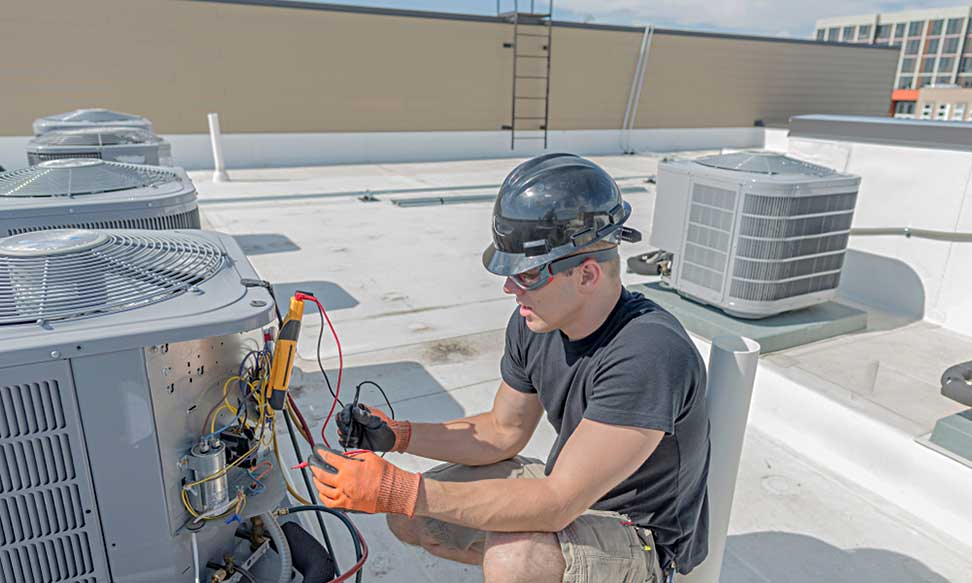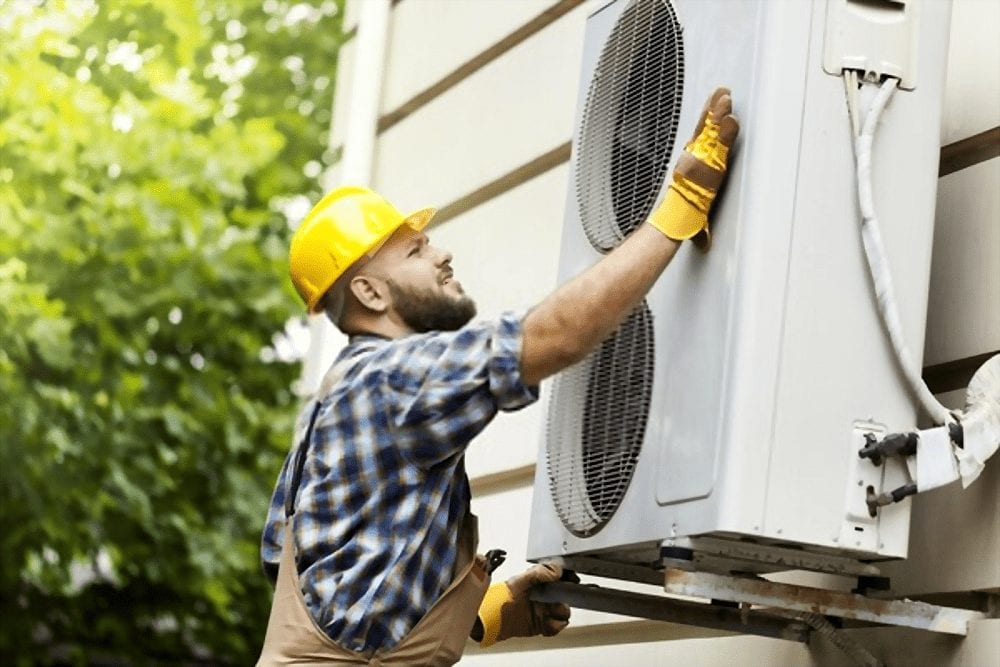Your First Steps with heat pump installation ooltewah tn
Your First Steps with heat pump installation ooltewah tn
Blog Article
Picking In Between a Heatpump and Furnace: Key Factors To Consider for Your Cooling And Heating Demands
When reviewing heating options for a/c needs, the choice in between a warm pump and a heating system can be complicated. Each system uses distinctive advantages tailored to specific climates and power effectiveness goals. Understanding these differences is necessary for making an enlightened option. Trick aspects such as setup prices and ecological influence even more complicate the selection procedure. Which option genuinely aligns with one's convenience and sustainability preferences? The complying with areas will discover these factors to consider carefully.
Comprehending Heat Pumps: Just How They Work and Their Advantages
While numerous house owners think about different heating choices, recognizing how warmth pumps function and their benefits can significantly affect their decision. Heat pumps run by transferring warmth as opposed to producing it. In the winter, they remove heat from the outside air or ground and move it inside, while in the summertime, they reverse this procedure, cooling the home by removing warm outside. This double performance makes them flexible for year-round environment control.One of the key advantages of heatpump is their power effectiveness. They utilize significantly less electrical power contrasted to standard heating unit, potentially causing reduced utility bills (furnace replacement). Furthermore, warm pumps have a smaller carbon footprint, making them an eco-friendly choice. They additionally need much less upkeep than conventional systems, adding to long-term cost financial savings. On the whole, comprehending the mechanics and benefits of heat pumps can help home owners make notified choices concerning their heating and cooling needs
Exploring Heating Systems: Kinds, Operation, and Advantages
Heaters are available in numerous kinds, consisting of gas, electric, and oil models, each with unique operational devices. Comprehending these distinctions is essential, as they influence performance and heating performance. In addition, heaters use countless advantages, such as regular heat output and reliability in cooler environments.
Kinds of Heaters
Heater can vary significantly in style and operation, with furnaces being a popular choice amongst home owners. There are numerous sorts of furnaces, each using different gas sources and technologies. Gas furnaces prevail, leveraging all-natural gas to create warmth effectively. Electric furnaces, on the various other hand, use electric resistance to generate warmth, usually preferred for their straightforward setup. Oil heaters, while less common, work in locations with limited gas access (ductless mini splits). Furthermore, condensing furnaces maximize energy efficiency by recording and reusing exhaust gases. Each type runs through a system of warmth exchangers and ductwork to distribute cozy air throughout a home. Understanding the differences in between these heater types is vital for educated cooling and heating decisions
Advantages of Heating systems
For property owners seeking dependable warmth during cool months, the advantages of heating systems are substantial. Furnaces provide regular home heating, guaranteeing also temperature levels throughout the home. They are particularly effective in extreme cold, usually exceeding warm pumps in freezing conditions. Different kinds, consisting of gas, electric, and oil furnaces, use adaptability to satisfy varied needs and preferences.Furnaces additionally have a tendency to have lower preliminary setup expenses contrasted to warmth pumps, making them an extra available choice for lots of. Their robust layout adds to a much longer life expectancy, with many devices lasting over 15 years with appropriate upkeep. In addition, modern heating systems are usually geared up with advanced technology for boosted effectiveness, which can bring about lowered power bills. Overall, heaters remain a trustworthy option for efficient home heating.

Power Performance: Comparing Heat Pumps and Furnaces
When contrasting power efficiency between heatpump and heaters, the Seasonal Power Performance Ratio (SEER) plays an important duty in identifying efficiency. Furthermore, a functional expense analysis discloses the lasting monetary ramifications of each system. Comprehending these aspects can assist house owners in making notified decisions about their heating options.
Seasonal Power Effectiveness Ratio
Energy efficiency plays a crucial duty in the decision-making process between warmth pumps and heating systems, particularly when thinking about the Seasonal Power Effectiveness Ratio (SEER) This metric actions the cooling effectiveness of heatpump over a whole air conditioning season, giving a standard means to assess efficiency. Higher SEER rankings indicate better power efficiency, converting to reduced power usage and reduced energy expenses. In comparison, heating systems are typically analyzed utilizing the Yearly Gas Use Efficiency (AFUE) score, which shows heating performance. When contrasting these two systems, homeowners need to prioritize SEER rankings for heat pumps, as they directly effect overall power cost savings and environmental sustainability. A detailed understanding of SEER can notably affect the long-lasting contentment and cost-effectiveness of the picked heating and cooling remedy.
Functional Cost Analysis
Comprehending the functional prices associated with heatpump and heaters is crucial for property owners evaluating their choices. Warmth pumps generally use greater power performance, transforming electrical energy right into heat with very little waste. This results in lower month-to-month energy bills, specifically in moderate environments. Alternatively, typical furnaces, specifically gas designs, may have lower upfront expenses however can incur greater functional expenditures gradually as a result of fuel rates and effectiveness ratings.Moreover, heat pumps can work as both home heating and cooling down systems, potentially decreasing the requirement for different cooling and heating devices. While initial investments for heatpump may be higher, their long-term cost savings in energy effectiveness can make them a much more affordable selection for many homes. Mindful analysis of regional power rates is vital to identify the most effective option.
Setup Costs: What to Expect for Each Heater
Installment costs for heater can vary significantly between heatpump and furnaces, influencing homeowners' decisions. Heatpump usually have greater upfront installment costs, usually varying from $3,500 to $8,000, relying on the device size and intricacy of installment. This consists of the outdoor unit, indoor handling system, and essential ductwork modifications. Alternatively, heating systems tend to have lower initial expenses, averaging in between $2,500 and $6,000, which can be appealing for budget-conscious home owners. Installment expenditures can raise if comprehensive ductwork is required.Moreover, the option of gas kind for furnaces-- all-natural gas, propane, or electric-- can also impact installation prices. While heatpump supply energy effectiveness, their initial financial investment might discourage some customers. Inevitably, evaluating installment expenses along with lasting financial savings and effectiveness will aid property owners in making educated decisions regarding their furnace.
Environment Factors To Consider: Which System Executes Better in Your Location
Exactly how do environment problems affect the efficiency of heater? The efficiency of warm pumps and heating systems can vary considerably depending upon the local climate. In moderate environments, heatpump succeed by effectively transferring warm from the outside air, making them an energy-saving option. Nevertheless, their performance lessens in very cool temperature levels, where they may have a hard time to draw out sufficient warmth. On the other hand, furnaces, especially gas models, give reliable and regular warmth no matter exterior problems, making them Our site more suitable in cooler regions.In areas that experience milder winters months, heatpump can operate efficiently year-round, providing both home heating and cooling. On the other hand, regions with severe winters months often gain from the toughness of heating systems. Ultimately, comprehending the regional environment is crucial when determining in between a heatpump and a heater, as it directly influences their operational effectiveness and total efficiency.
Maintenance Requirements: Long-Term Take Care Of Warmth Pumps vs. Furnaces
While both heatpump and heaters need regular upkeep to guarantee peak efficiency, their certain needs and care regimens vary considerably. Furnaces normally need much less regular interest, with annual examinations sufficing to look for gas leaks, tidy filters, and analyze general functionality. Their simpler style often permits uncomplicated repairs.In contrast, warmth pumps require semiannual upkeep because of their twin duty in cooling and heating. This consists of cleaning coils, inspecting cooling agent degrees, and ensuring that both the outdoor and indoor systems function at their finest. In addition, heatpump maintenance frequently involves even more elaborate parts, making expert servicing essential.Neglecting upkeep can cause diminished effectiveness and increased energy prices for both systems. Eventually, home owners should take into consideration these long-lasting treatment requirements when selecting in between a heatpump and a heater, as aggressive upkeep can extend the life-span and efficiency of either system considerably.
Environmental Influence: Picking a Sustainable Heating Option
The environmental effect of furnace is a vital assessment for home owners looking for lasting choices. Heatpump are typically much more energy-efficient than typical heating systems, as they transfer warm rather than produce it, considerably reducing carbon exhausts. By using sustainable energy sources, such as air-source or geothermal heatpump, homeowners can better reduce their this ecological footprint.On the various other hand, gas heaters release greenhouse gases and contribute to air pollution, though they frequently give greater heat output. Improvements in innovation have led to the development of high-efficiency furnaces that minimize emissions.Ultimately, selecting a home heating system involves considering performance versus environmental impact. Homeowners are urged to mirror on local power resources and rewards for eco-friendly systems, ensuring a selection that straightens with both individual comfort and ecological responsibility. The decision affects not just instant comfort however likewise lasting sustainability and ecological health and wellness.
Often Asked Inquiries
For How Long Do Heat Pumps and Furnaces Usually Last?
The life-span of heatpump usually ranges from 15 to two decades, while heating systems can last between 15 to three decades. Normal upkeep considerably affects their longevity and efficiency in providing heating remedies.
Can I Utilize a Heatpump in Exceptionally Cold Climates?
Heatpump can operate in incredibly cool climates, however their efficiency decreases as temperatures decrease. In such conditions, supplementary home heating resources might be required to preserve comfortable interior temperature levels and assure peak performance.

What Is the Noise Level of Heat Pumps Versus Furnaces?
The sound degrees of heat pumps and heating systems differ significantly. Usually, heat pumps operate more silently than standard furnaces, making them more suitable for those sensitive to seem, while heaters might generate louder functional sounds during heating cycles.
Are Warm Pumps Suitable for Both Heating & Cooling?
Heatpump are indeed suitable for both heating & cooling (heat pump service). They operate by moving heat, providing reliable temperature control year-round, making them a functional option for property owners seeking an all-in-one heating and cooling service
What Dimension Home Heating System Do I Required for My Home?
Establishing the appropriate dimension heating unit for a home requires evaluating aspects such as square footage, insulation high quality, local environment, and the home's layout. Consulting a specialist can guarantee an exact assessment and ideal convenience. Heat pumps typically offer higher energy performance, converting electric power into heat with very little waste. In moderate climates, heat pumps stand out by successfully moving warm from the outside air, making them an energy-saving alternative. Alternatively, heaters, particularly gas designs, supply reliable and constant warm no matter of outside problems, making them more suitable in colder regions.In areas that experience milder wintertimes, warm pumps can operate successfully year-round, giving both heating and cooling. Heat pumps are usually extra energy-efficient than typical heaters, as they move warm rather than generate it, these details greatly minimizing carbon discharges. By using renewable energy sources, such as air-source or geothermal warmth pumps, house owners can additionally reduce their ecological footprint.On the other hand, all-natural gas furnaces discharge greenhouse gases and add to air contamination, though they often provide higher warmth result.
Report this page